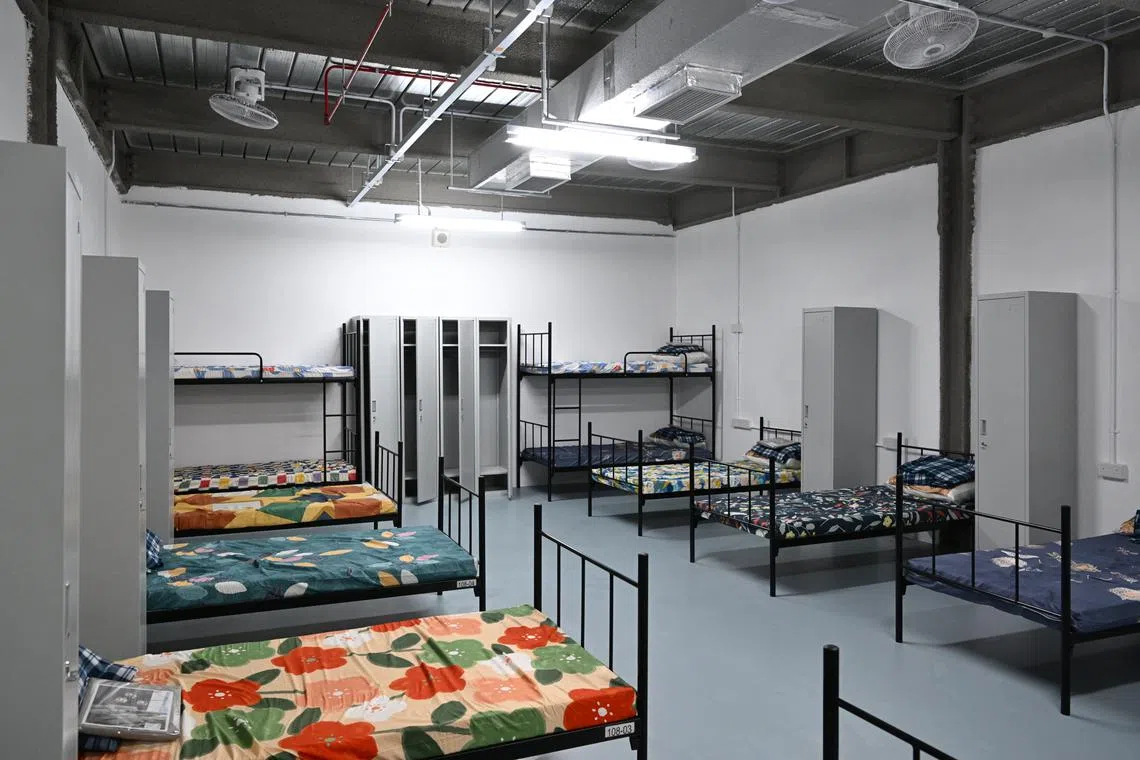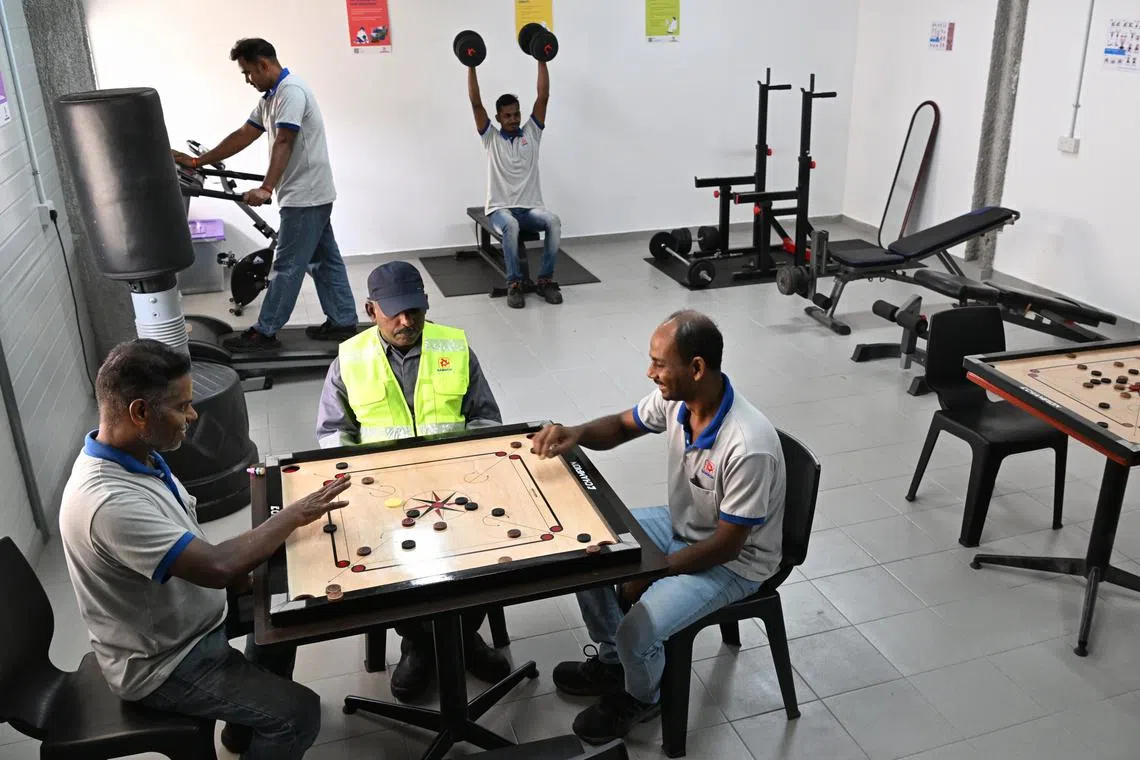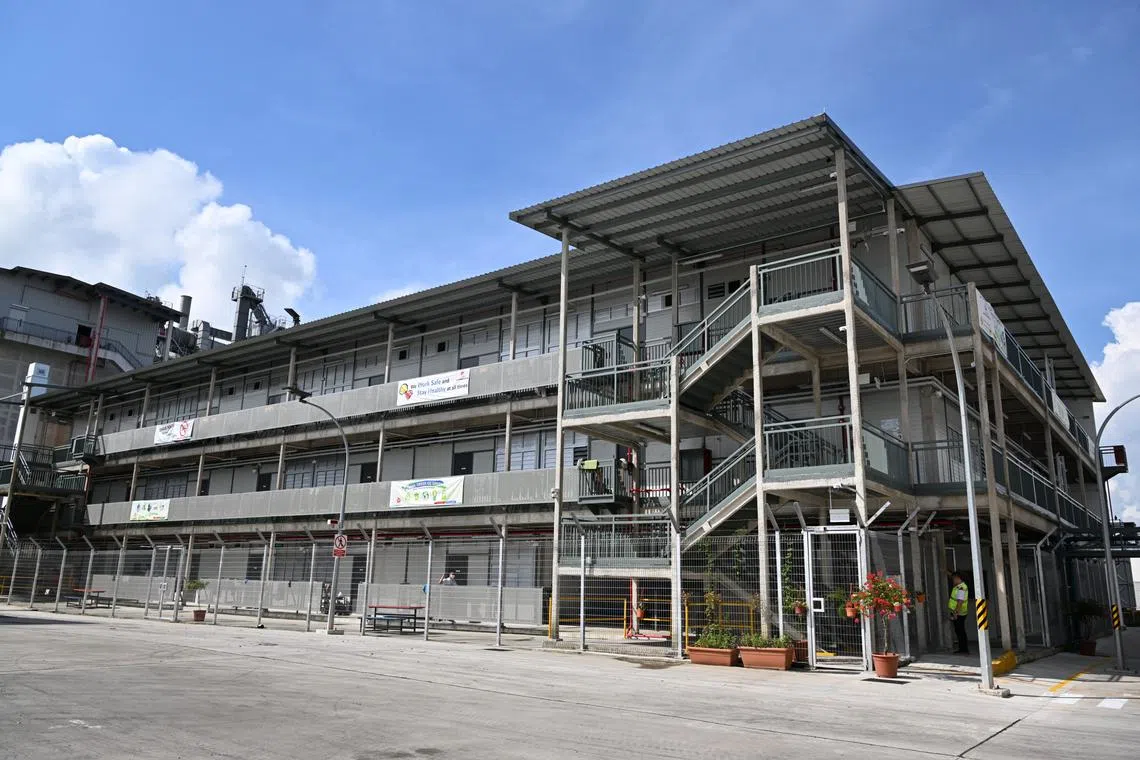Improved standards for foreign worker dorms gain traction
Sign up now: Get ST's newsletters delivered to your inbox

Rooms for foreign workers at a new dormitory in Samwoh's headquarters are air-conditioned, and come with ceiling fans and free Wi-Fi.
ST PHOTO: CHONG JUN LIANG
SINGAPORE - Since moving into a new three-storey dormitory block at his company’s headquarters in Kranji Way in January, facilities supervisor Arumugam Loganathan has been waking up more refreshed.
For the first time in the 16 years that he has been working in Singapore, the 41-year-old Indian national sleeps in air-conditioned comfort each night.
While his room at the new dorm has 12 beds compared with six at his previous place, he said he has more personal space. Another perk is an en-suite toilet in his room.
The dormitory was built by his employer, home-grown engineering and construction company Samwoh, and is among a handful that meet improved standards mandated by the Foreign Employee Dormitories Act (Feda).
Other features that Samwoh showcased to the media during a visit to the new dorm on Friday include four dedicated isolation rooms.
This fulfils a new requirement under Feda for newly built dorms to have at least 10 isolation beds for every 1,000 bed spaces, up from just one per 1,000 bed spaces previously.
Additionally, the dormitory block can be physically split into four zones, so residents can be properly segregated in the event of another pandemic.
Samwoh chief executive Eric Soh told reporters that the design of the new dorm took in lessons from Covid-19 and the company’s previous experience managing migrant worker housing.
“The business continuity plan is important, so we have incorporated quite a lot of that here,” he said.
Feda, which previously applied only to dorms that accommodate 1,000 or more workers, was expanded on April 1 to cover all worker dorms with seven beds or more, giving the authorities more levers to act against errant dorm operators and contain disease outbreaks more quickly.
Under the law, improved standards for worker dorms include a cap of 12 residents in each room, at least one en-suite toilet for every six residents and better ventilation.
The caveat is that these higher standards have been imposed only on newly built dorms for now, with the Ministry of Manpower (MOM) citing feedback about the cost and infrastructural challenges in retrofitting existing dorms that house the vast majority of migrant workers.
A transition plan,

Foreign workers enjoying a game of carrom and use of the fitness machines in the recreation room at their dormitory in the Samwoh headquarters.
ST PHOTO: CHONG JUN LIANG
Mr Soh said Samwoh has no plans to retrofit its two other existing dorms in Kranji Crescent as the lease on the land that they are on will expire in 2025. These two dorms have 50 and 150 beds respectively.
Instead, by year-end, 480 of Samwoh’s 630-odd foreign workers will move into the company’s new dorm in Kranji Way.
Samwoh’s decision to build a new dorm at the company headquarters – which opened in December 2022 – came in the midst of the Covid-19 pandemic.
“When this piece of land was allocated to us, there was no intention for there to be a dorm here because at the time there were a lot of commercial beds available,” Mr Soh said.
“Then the pandemic struck, and we saw what happened with the foreign workers here, so we made an appeal to the authorities. Having workers at our own dorm makes it easier to manage and take care of them. There are also savings compared with leasing beds outside,” he added.
While the new dorm costs upwards of $6 million, Mr Soh believes this investment will pay off in the long run. This is especially since foreign worker housing is expected to be at full capacity for some time, and rental rates have shot through the roof as a result.
He added: “We are not in the dormitory business, but we build what we need. The ultimate aim is really to take care of our workers.”

The new dorm has been built to the latest specifications under the Foreign Employee Dormitories Act.
ST PHOTO: CHONG JUN LIANG
While Samwoh’s new dorm is an example of the progress being made in the migrant worker housing space, the Humanitarian Organisation for Migration Economics (Home) said Singapore’s push to house more workers in dorms has led to a loss of freedom and community for some.
A Home spokesman said workers are subjected to more restrictions and surveillance when they stay in dorms, and there have been occasions when those with employment disputes are told not to leave the premises without their employer’s permission.
The advocacy group also claimed that the increased housing costs are being passed on to workers via salary deductions.
Home said: “We see workers with a daily wage between $16 and $20 who have had up to $300 deducted monthly for housing and amenities.”
On the bright side, the Migrant Workers’ Centre (MWC) said there has been a sharp decline in the inquiries it receives from workers that pertain to living conditions at dorms.

Construction firm Samwoh has completed a new three-storey dormitory at its headquarters in Kranji Way that will house 480 of the company’s own foreign workers by year-end.
ST PHOTO: CHONG JUN LIANG
MWC executive director Michael Lim said this is likely due to the effective enforcement of Feda regulations, though he also raised the possibility that such inquiries are now being directed to MOM’s Assurance, Care and Engagement Group, which was set up during the pandemic to manage migrant worker issues.
“We feel that more can be done to improve the well-being and welfare of migrant workers,” Mr Lim said, adding that the MWC continues to push for better distribution and storage of meals for workers.
“MWC wishes to reiterate that the care, well-being and dignity we afford to all migrant workers should not be compromised,” he said.



